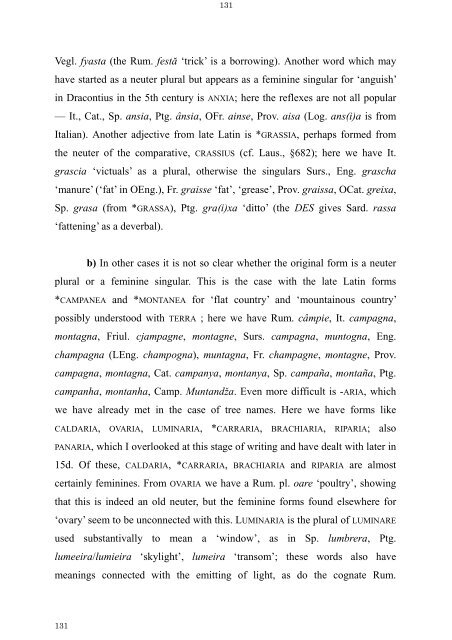The Latin Neuter Plurals in Romance - Page ON
The Latin Neuter Plurals in Romance - Page ON
The Latin Neuter Plurals in Romance - Page ON
You also want an ePaper? Increase the reach of your titles
YUMPU automatically turns print PDFs into web optimized ePapers that Google loves.
131<br />
131<br />
Vegl. fyasta (the Rum. festă ‘trick’ is a borrow<strong>in</strong>g). Another word which may<br />
have started as a neuter plural but appears as a fem<strong>in</strong><strong>in</strong>e s<strong>in</strong>gular for ‘anguish’<br />
<strong>in</strong> Dracontius <strong>in</strong> the 5th century is ANXIA; here the reflexes are not all popular<br />
— It., Cat., Sp. ansia, Ptg. ânsia, OFr. a<strong>in</strong>se, Prov. aisa (Log. ans(i)a is from<br />
Italian). Another adjective from late <strong>Lat<strong>in</strong></strong> is *GRASSIA, perhaps formed from<br />
the neuter of the comparative, CRASSIUS (cf. Laus., §682); here we have It.<br />
grascia ‘victuals’ as a plural, otherwise the s<strong>in</strong>gulars Surs., Eng. grascha<br />
‘manure’ (‘fat’ <strong>in</strong> OEng.), Fr. graisse ‘fat’, ‘grease’, Prov. graissa, OCat. greixa,<br />
Sp. grasa (from *GRASSA), Ptg. gra(i)xa ‘ditto’ (the DES gives Sard. rassa<br />
‘fatten<strong>in</strong>g’ as a deverbal).<br />
b) In other cases it is not so clear whether the orig<strong>in</strong>al form is a neuter<br />
plural or a fem<strong>in</strong><strong>in</strong>e s<strong>in</strong>gular. This is the case with the late <strong>Lat<strong>in</strong></strong> forms<br />
*CAMPANEA and *M<strong>ON</strong>TANEA for ‘flat country’ and ‘mounta<strong>in</strong>ous country’<br />
possibly understood with TERRA ; here we have Rum. câmpie, It. campagna,<br />
montagna, Friul. cjampagne, montagne, Surs. campagna, muntogna, Eng.<br />
champagna (LEng. champogna), muntagna, Fr. champagne, montagne, Prov.<br />
campagna, montagna, Cat. campanya, montanya, Sp. campaña, montaña, Ptg.<br />
campanha, montanha, Camp. Muntandža. Even more difficult is -ARIA, which<br />
we have already met <strong>in</strong> the case of tree names. Here we have forms like<br />
CALDARIA, OVARIA, LUMINARIA, *CARRARIA, BRACHIARIA, RIPARIA; also<br />
PANARIA, which I overlooked at this stage of writ<strong>in</strong>g and have dealt with later <strong>in</strong><br />
15d. Of these, CALDARIA, *CARRARIA, BRACHIARIA and RIPARIA are almost<br />
certa<strong>in</strong>ly fem<strong>in</strong><strong>in</strong>es. From OVARIA we have a Rum. pl. oare ‘poultry’, show<strong>in</strong>g<br />
that this is <strong>in</strong>deed an old neuter, but the fem<strong>in</strong><strong>in</strong>e forms found elsewhere for<br />
‘ovary’ seem to be unconnected with this. LUMINARIA is the plural of LUMINARE<br />
used substantivally to mean a ‘w<strong>in</strong>dow’, as <strong>in</strong> Sp. lumbrera, Ptg.<br />
lumeeira/lumieira ‘skylight’, lumeira ‘transom’; these words also have<br />
mean<strong>in</strong>gs connected with the emitt<strong>in</strong>g of light, as do the cognate Rum.









